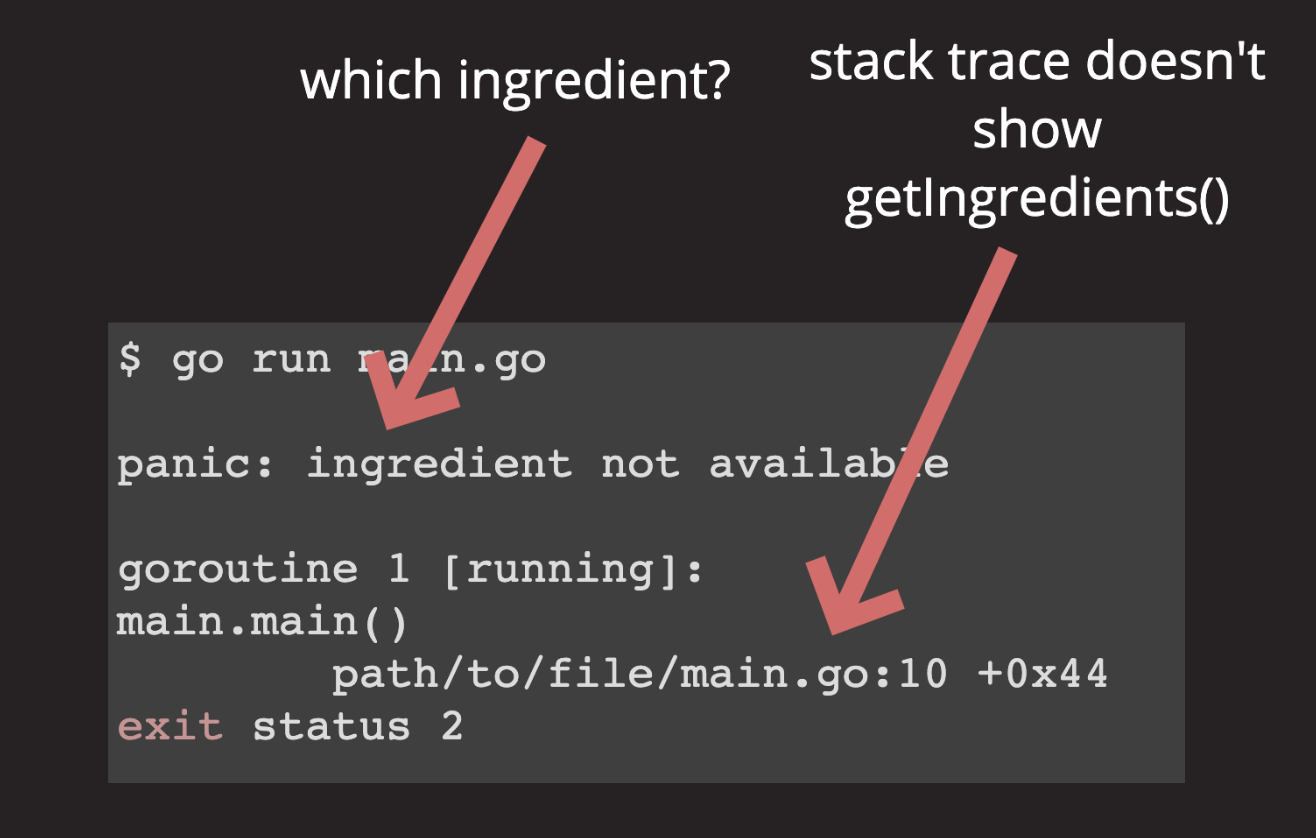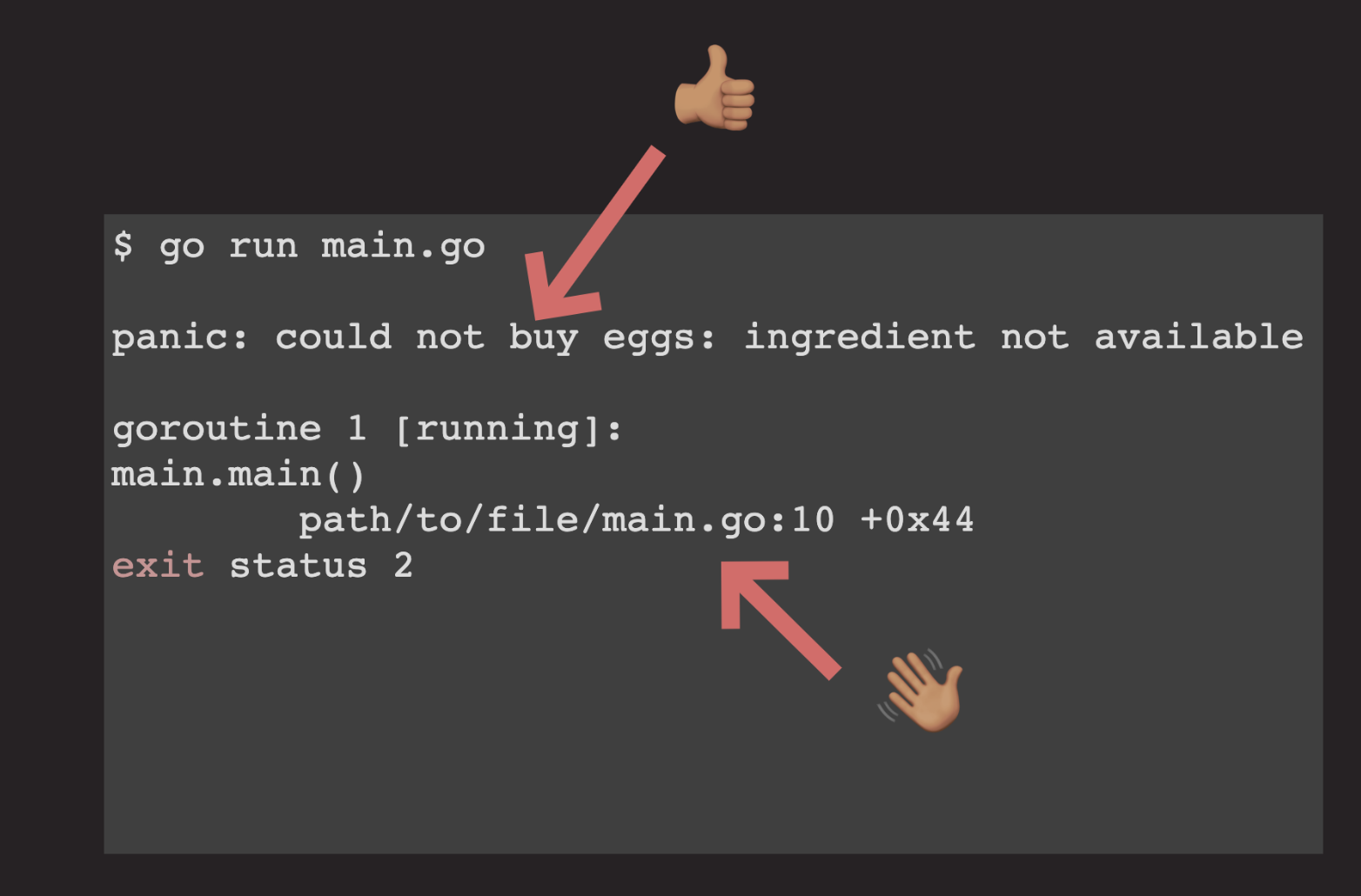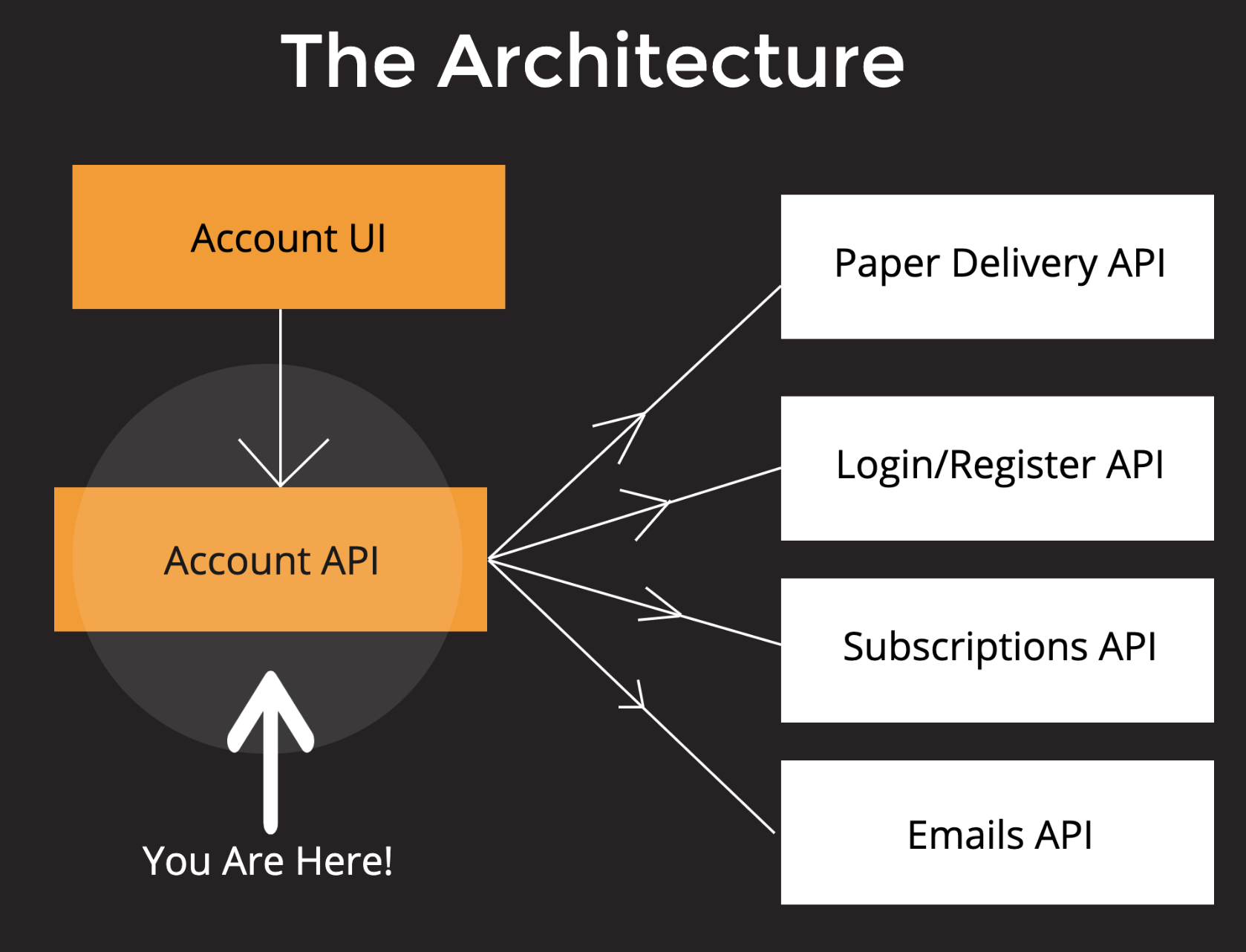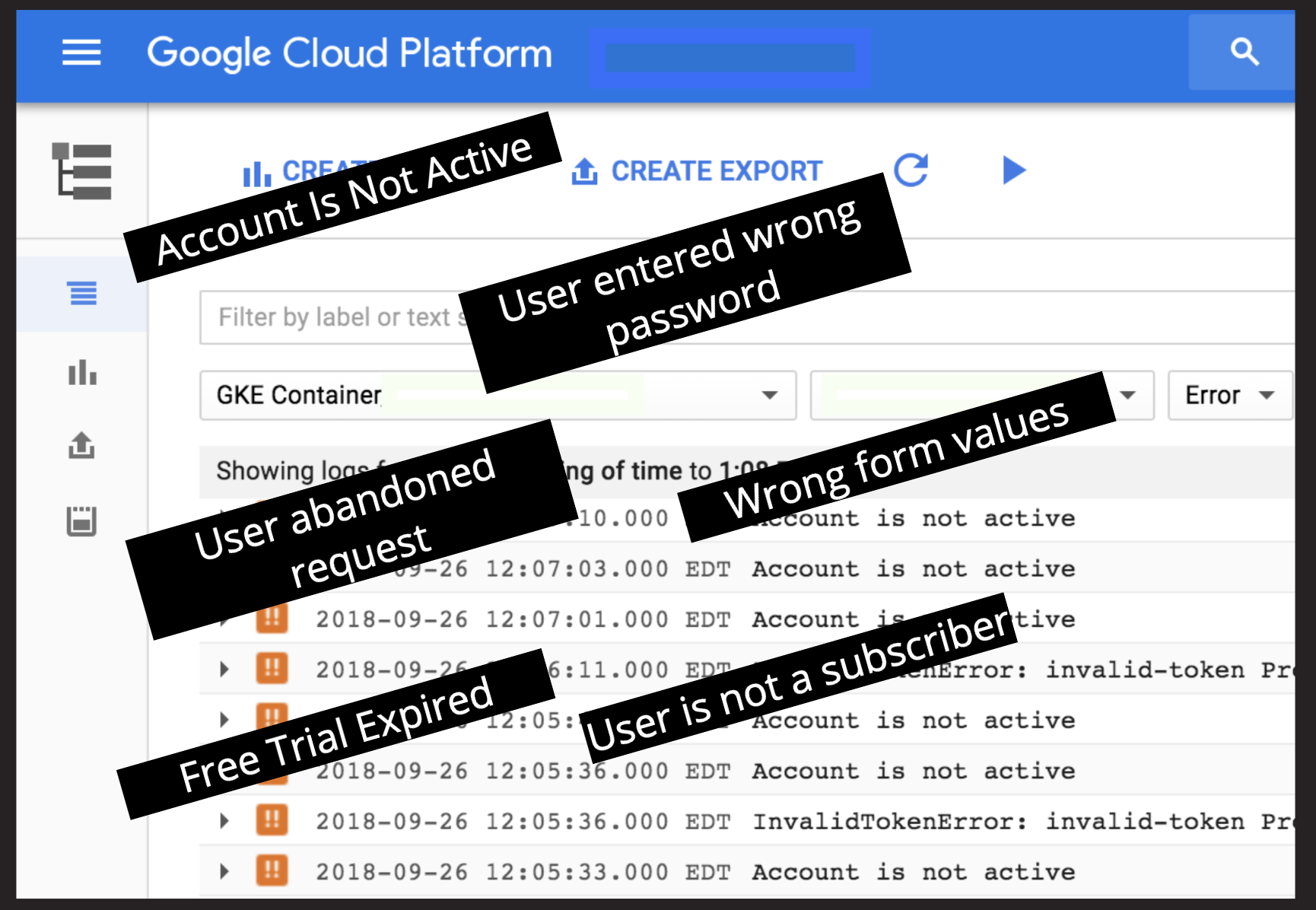GopherCon 2019 - Handling Go errors
Marvin Guerra for the GopherCon 2019 Liveblog on July 25, 2019
Presenter: Marwan Sulaiman
Liveblogger: Marvin Guerra
Overview
Let's talk about programmable errors and how you can design your own architecture that allows you to legibly master your system failures.
Summary
-
Errors are
i/o:- Sometimes you need to read an error
- Sometimes you need to write an error
- How can this be improved?
- Don't just check errors => Handle them gracefully
- Stack traces are for disasters: Decorate errors for better tracing
How to improve error tracing?
- Categorize errors by severity
- Categorize errors by type
- Add application specific data
- You can query all of the above
Learning concepts vs. Learning syntax
Assuming Go isn't your first programming language, there are two ways to approach diving into a new language, Marwan explains. When learning syntax, one can ask:
How do I parse a JSON string in Go?
If on other hand, we are learning the concept, the question is:
What is data serialization?
Another example:
Syntax: How do I import a library in Go?
Concept: What are dependencies?
And with regards to errors:
Syntax: How do I catch an error in Go?
Concept: What is error handling?

Let's focus on concepts and use the flexibility of Go to create better tooling for error handling and tracing.
Concept of Errors
Errors are values:
- PRO: You get to define the importance of errors
- CON: You get to define the importance of errors
We can furthermore think of errors as just i/o:
- Sometimes you need to read an error
- Sometimes you need to write an error
But when reading or writing an error, context matters in understanding what caused the error as well as how to address it. e.g.:
- Is your program a CLI tool?
- Is your program a library?
- Is your program a long running system?
- Who is consuming your program? And How?
Example: Make a sandwich

Let's pretend we are designing a service that fetches ingredients from different sources and then returns a slice of ingredients. Our code may look like:
package main
import (
"markets/wholefoods"
"markets/traderjoes"
"markets/shoppers"
)
func getIngredients() ([]Ingredient, error) {
avocados, err := wholefoods.BuyAvocados()
boiledEggs, err := traderjoes.BuyEggs()
bread, err := shoppers.BuyBread()
return []Ingredient{avocados, boiledEggs, bread}, nil
}Now the above code assumes there are no errors. So how do we handle errors? Well we can rewrite getIngredients to actually return an error when they are returned from an upstream module:
func getIngredients() ([]Ingredient, error) {
avocados, err := wholefoods.BuyAvocados()
if err != nil {
return nil, err
}
boiledEggs, err := traderjoes.BuyEggs()
if err != nil {
return nil, err
}
bread, err := shoppers.BuyBread()
if err != nil {
return nil, err
}
return []Ingredient{avocados, boiledEggs, bread}, nil
}So what would we see now if we ran the above?
func main() {
ingredients, err := getIngredients()
if err != nil {
panic(err)
}
makeSandwich(ingredients)
}
As we can see the default behavior leaves out a lot of information about the context of the error. "Don't just check errors, handle them gracefully" - Marwan
Let's now discuss how we can decorate errors in go:
- Can use
fmtto create a new error with more context:
return fmt.Errorf("unique error message: %w", err)- Alternatively can
import "github.com/pkg/errors"and use this module's wrapping ability:
return errors.Wrap(err, "unique error message")Let's look at the getIngredients function now:
import "github.com/pkg/errors"
func getIngredients() ([]Ingredient, error) {
avocados, err := wholefoods.BuyAvocados()
if err != nil {
return nil, errors.Wrap(err, "could not buy avocados")
}
boiledEggs, err := traderjoes.BuyEggs()
if err != nil {
return nil, errors.Wrap(err, "could not buy eggs")
}
bread, err := shoppers.BuyBread()
if err != nil {
return nil, errors.Wrap(err, "could not buy bread")
}
return []Ingredient{avocados, boiledEggs, bread}, nil
}Now we have additional context in our error log and no longer need stacktrace:

Stacktraces are for disasters
- They're hard to read
- They're hard to parse
- At best, they say where an error went wrong, and not why
What if we want to act on an error?
Since errors are values we can create specific ones and compare to take specific actions:
import "github.com/pkg/errors"
func getIngredients() ([]Ingredient, error) {
avocados, err := wholefoods.BuyAvocados()
if err != nil {
return nil, errors.Wrap(err, "could not buy avocados")
}
boiledEggs, err := traderjoes.BuyEggs()
if err == tradejoes.ErrNotAvailable {
boiledEggs, err = wholefoods.BuyEggs()
}
if err != nil {
return nil, errors.Wrap(err, "could not buy eggs")
}
bread, err := shoppers.BuyBread()
if err != nil {
return nil, errors.Wrap(err, "could not buy bread")
}
return []Ingredient{avocados, boiledEggs, bread}, nil
}Now we can handle errors gracefully, trace the error back to the code and act upon an error. What more can we do?
- Categorize errors by severity.
- Categorize errors by type.
- Add application specific data.
- Query all of the above.
Let's take a look at how this relates to The New York Times. Like many companies, The New York Times has several services that talk to each other:

Not much different from making sandwiches:
- One service that talks to a bunch of other services
- Instead of panicking, we log and monitor
func getUser(userID string) (Subscription, time.Time, error) {
err := loginService.Validate(userID)
if err != nil {
return err
}
subscription, err := subscriptionService.Get(userID)
if err != nil {
return err
}
deliveryTime, err := deliveryService.GetTodaysDeliveryTime(userID)
if err != nil {
return err
}
return subscription, deliveryTime, nil
}and in an http handler:
func getUserHandler(w http.ResponseWriter, r *http.Request) {
// set up handler
sub, deliveryTime, err := getUser(user)
if err != nil {
logger.Error(err)
fmt.Fprint(w, "something went wrong")
return
}
// return info to client
}Now our errors are logged and we have some context:

However, we are still missing severity as well as types of errors so how can this be improved?
- Can filter unexpected errors
- Group by error types
- Be able to answer specific questions
-
Inspiration:
Let's create our own error struct:
package errors
type Error struct {
Op Op // operation
Kind Kind // category of errors
Err error // the wrapped error
//... application specific fields
}How do we use?
if err != nil {
return &errors.Error{
Op: "getUser",
Err: err,
}
}Alternatively, can use a helper function:
package errors
func E(args ...interface{}) error {
e := &Error{}
for _, arg := range args {
switch arg := arg.(type) {
case Op:
e.Op = arg
case error:
e.Err = arg
case Kind:
e.Kind = arg
default:
panic("bad call to E")
}
}
return e
}if err != nil {
return errors.E(op, err, errors.KindUnexpected)
}What is an Operation?
type Op string- A unique string describing a method or a function
- Multiple operations can construct a friendly stack trace.
// app/account/account.go
package account
func getUser(userID string) (*User, err) {
const op errors.Op = "account.getUser"
err := loginService.Validate(userID)
if err != nil {
return nil, errors.E(op, err)
}
...
}
// app/login/login.go
package login
func Validate(userID string) err {
const op errors.Op = "login.Validate"
err := db.LookUpUser(userID)
if err != nil {
return nil, errors.E(op, err)
}
}// app/errors/errors.go
package errors
// Ops returns the "stack" of operations
// for each generated error.
func Ops(e *Error) []Op {
res := []Op{e.Op}
subErr, ok := e.Err.(*Error)
if !ok {
return res
}
res = append(res, Ops(subErr)...)
return res
}What does our stacktrace look like now?
// errors.Ops stack trace
["account.GetUser", "login.Validate", "db.LookUp"]vs.
// classic stacktrace
goroutine 19 [running]:
net/http.(*conn).serve.func1(0xc0000928c0)
/usr/local/go/src/net/http/server.go:1746 +0xd0
panic(0x12459c0, 0x12eb450)
/usr/local/go/src/runtime/panic.go:513 +0x1b9
db.LookUp(...)
/Users/208581/go/src/app/db/lookup.go:25
login.Validate(...)
/Users/208581/go/src/app/login/login.go:21
account.getUser(...)
/Users/208581/go/src/app/account/account.go:17
main.getUserHandler(0x12ef4e0, 0xc000118000, 0xc000112000)
/Users/208581/go/src/app/account/account.go:17
net/http.HandlerFunc.ServeHTTP(0x12bc838, 0x12ef4e0, 0xc000118000, 0xc000112000)
/usr/local/go/src/net/http/server.go:1964 +0x44
net/http.(*ServeMux).ServeHTTP(0x149f720, 0x12ef4e0, 0xc000118000, 0xc000112000)
/usr/local/go/src/net/http/server.go:2361 +0x127
net/http.serverHandler.ServeHTTP(0xc000098d00, 0x12ef4e0, 0xc000118000, 0xc000112000)
/usr/local/go/src/net/http/server.go:2741 +0xab
net/http.(*conn).serve(0xc0000928c0, 0x12ef6e0, 0xc00009e240)
/usr/local/go/src/net/http/server.go:1847 +0x646
created by net/http.(*Server).Serve
/usr/local/go/src/net/http/server.go:2851 +0x2f5Benefits of errors.Op
- A custom stack of your code only
- Easier to read
- Parsable and queryable.
- Not only can you know where something went wrong, but the impact it had on your entire application.
Query your stack trace
SELECT * FROM logs WHERE operations.include("login.Validate")
["account.getUser"],
["account.resetPassword"],
["homeDelivery.changeAddress"]Kind
- Groups all errors into smaller categories
- Can be predefined codes (http/gRPC)
- Or it can be your own defined codes
const (
KindNotFound = http.StatusNotFound
KindUnauthorized = http.StatusUnauthorized
KindUnexpected = http.StatusUnexpected
)Extracting a Kind from an error
func Kind(err error) codes.Code {
e, ok := err.(*Error)
if !ok {
return KindUnexpected
}
if e.Kind != 0 {
return e.Kind
}
return Kind(e.Err)
}Let's add severity to our errors:
type Error struct {
...
Severity logrus.Level
}func getUser(userID string) (*User, err) {
const op errors.Op = "account.getUser"
err := loginService.Validate(userID)
if err != nil {
return nil, errors.E(op, err, logrus.InfoLevel)
}
...
}
func getUserHandler(w http.ResponseWriter, r *http.Request) {
// set up handler
sub, deliveryTime, err := getUser(user)
if err != nil {
logger.SystemErr(err)
http.Error(w, "something went wrong", errors.Kind(err))
return
}
// return info to client
}
func SystemErr(err error) {
sysErr, ok := err.(*errors.Error)
if !ok {
logger.Error(err)
return
}
entry := logger.WithFields(
"operations", errors.Ops(sysErr),
"kind", errors.Kind(err),
// application specific data
)
switch errors.Level(err) {
case Warning:
entry.Warnf("%s: %v", sysErr.Op, err)
case Info:
entry.Infof("%s: %v", sysErr.Op, err)
case Debug:
entry.Debugf("%s: %v", sysErr.Op, err)
default:
entry.Errorf("%s: %v", sysErr.Op, err)
}
}What can we do with this?
- Show me all paper delivery errors in zip code 22434
- Show me all food delivery errors by seafood restaurants
- Show me all errors that happened while trying to stream the latest Beyonce album
Takeaways:
- The error interface is intentionally simple.
- Design an errors package that makes sense to your application, and no one else
Conclusion
A big part of all programming, for real, is how you handle errors - Rob Pike